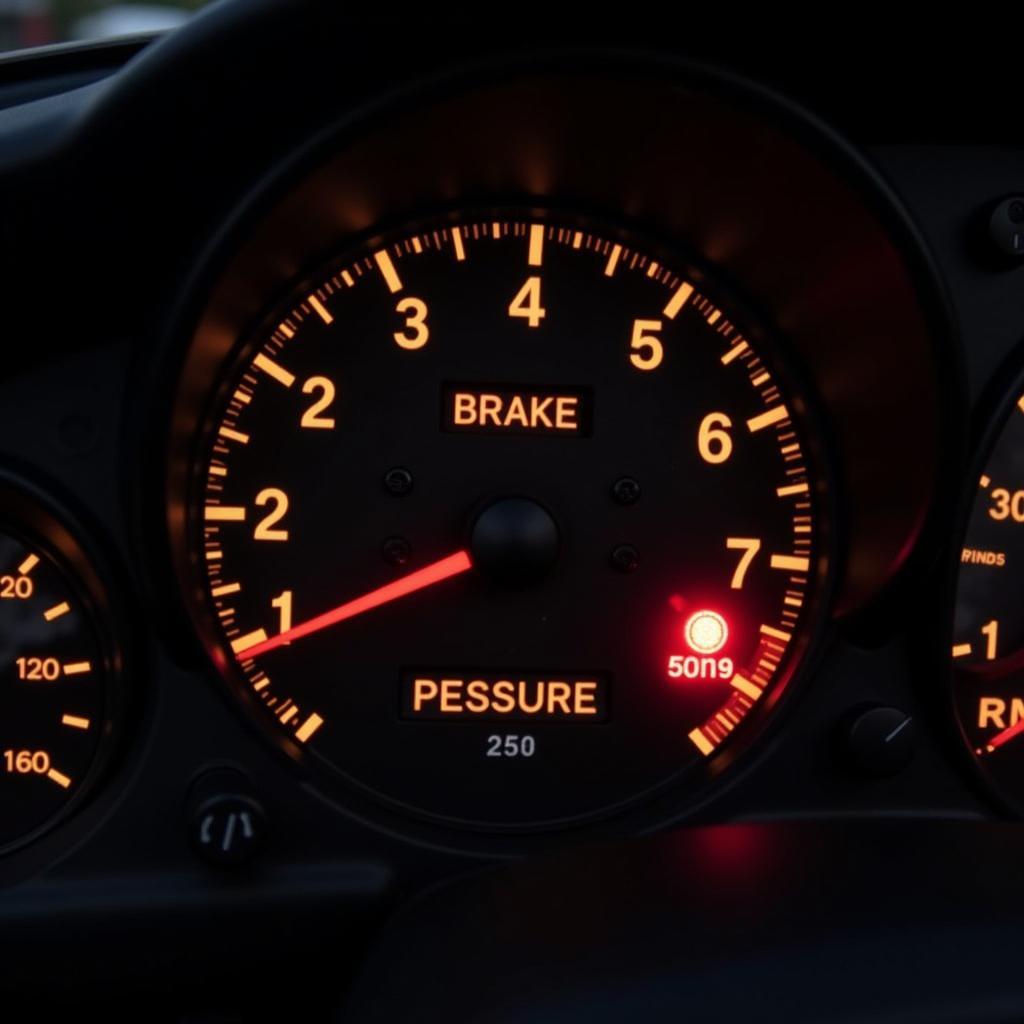The brake warning light on your 1999 Dodge Caravan is a crucial safety feature, illuminating on your dashboard to signal potential issues within your braking system. Ignoring this warning light could lead to dangerous situations on the road. This comprehensive guide will walk you through the common causes of a lit brake warning light on your 1999 Dodge Caravan and provide practical solutions to help you address them.
While this guide offers helpful information, always remember that consulting a qualified mechanic for a thorough diagnosis is recommended, especially if you’re unsure about performing any repairs yourself.
Common Causes of a 1999 Dodge Caravan Brake Warning Light
Several factors can trigger the brake warning light in your minivan. Let’s explore some of the most prevalent causes:
1. Low Brake Fluid Level
One of the most frequent culprits is a low brake fluid level. This vital fluid transmits the force applied to the brake pedal to the wheels, enabling your vehicle to stop.
How to check your brake fluid level:
- Locate the brake fluid reservoir under the hood. It’s typically a translucent plastic container with a black cap labeled “Brake Fluid.”
- Check the fluid level against the “Min” and “Max” markings on the reservoir.
- If the level is below the “Min” mark, you’ll need to add more brake fluid.
Important: Always use the brake fluid type specified in your owner’s manual.
2. Worn Brake Pads
Your brake pads are designed to wear down over time. As you apply the brakes, the pads press against the rotors, creating friction to slow down or stop your Caravan.
When the brake pads wear thin, a small metal tab on the pad makes contact with the rotor, triggering the brake warning light. This serves as a clear signal that it’s time for a brake pad replacement.
3. Faulty Brake Caliper
The brake caliper houses the brake pads and pistons, playing a vital role in applying pressure to the brake pads when you press the brake pedal. A malfunctioning caliper can cause uneven brake pad wear, sticking brakes, or a dragging sensation, ultimately triggering the warning light.
4. ABS Issues
Your 1999 Dodge Caravan likely features an Anti-lock Braking System (ABS). This system prevents wheel lockup during hard braking, improving vehicle control and stability.
If the ABS control module, wheel speed sensors, or other ABS components malfunction, it can illuminate the brake warning light.
Note: A faulty ABS system may also trigger the ABS warning light on your dashboard.
5. Brake Light Switch Problem
The brake light switch, located behind the brake pedal, activates your brake lights when you press the pedal. A malfunctioning switch can disrupt the electrical circuit associated with the brake lights and the brake warning system, potentially causing the warning light to illuminate.
Troubleshooting the Brake Warning Light
Here’s a step-by-step guide to help you troubleshoot the brake warning light on your 1999 Dodge Caravan:
-
Check the brake fluid level: As mentioned earlier, this is the first and easiest step. If the level is low, add the recommended brake fluid. However, if you notice a consistent need to top up the brake fluid, it indicates a leak that requires immediate professional attention.
-
Inspect the brake pads: If you’re comfortable with basic car maintenance, you can visually inspect your brake pads. Look for signs of significant wear, such as thin pads or exposed metal. If you’re unsure, take your Caravan to a mechanic for inspection.
-
Listen for unusual noises: Screeching, grinding, or clicking sounds during braking can indicate worn brake pads, faulty calipers, or other brake system issues.
-
Check your brake lights: Have a friend or family member press the brake pedal while you stand behind the vehicle to ensure all brake lights illuminate correctly. A faulty brake light switch might be the culprit if the lights don’t work.
When to Seek Professional Help
While some brake warning light issues can be addressed with basic troubleshooting, it’s crucial to consult a qualified mechanic if:
- You’re uncomfortable with DIY car repairs.
- You’ve tried troubleshooting but the problem persists.
- You suspect a complex issue like a faulty ABS system or brake caliper problems.
Ignoring a persistent brake warning light can lead to more severe and costly repairs down the line and, more importantly, compromise your safety on the road.
Conclusion
Addressing the brake warning light on your 1999 Dodge Caravan promptly is essential for your safety and the vehicle’s longevity. Understanding the common causes and knowing how to perform basic troubleshooting can save you time, money, and potential hazards.
Remember, when in doubt, always consult a qualified mechanic for a comprehensive diagnosis and repair.


